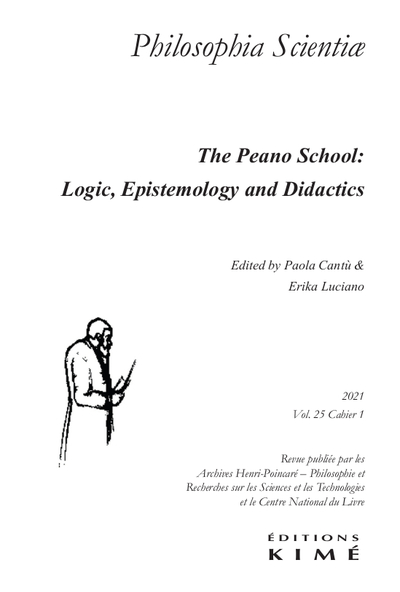Nous utilisons des cookies pour améliorer votre expérience. Pour nous conformer à la nouvelle directive sur la vie privée, nous devons demander votre consentement à l’utilisation de ces cookies. En savoir plus.
PHILOSOPHIA SCIENTIAE VOL.25/1 - GIUSEPPE PEANO AND HIS SCHOOL : LOGIC, EPISTEMOLOGY AND DIDACTICS
Kime - EAN : 9782380720006
Édition papier
EAN : 9782380720006
Paru le : 19 mars 2021
24,00 €
22,75 €
Disponible
Pour connaître votre prix et commander, identifiez-vous
Notre engagement qualité
-
 Livraison gratuite
Livraison gratuite
en France sans minimum
de commande -
 Manquants maintenus
Manquants maintenus
en commande
automatiquement -
 Un interlocuteur
Un interlocuteur
unique pour toutes
vos commandes -
 Toutes les licences
Toutes les licences
numériques du marché
au tarif éditeur -
 Assistance téléphonique
Assistance téléphonique
personalisée sur le
numérique -
 Service client
Service client
Du Lundi au vendredi
de 9h à 18h
- EAN13 : 9782380720006
- Editeur : Kime
- Date Parution : 19 mars 2021
- Disponibilite : Disponible
- Barème de remise : NS
- Nombre de pages : 200
- Format : 1.50 x 14.50 x 21.00 cm
- Poids : 252gr
- Résumé : Peano’s axioms for arithmetic, published in 1889, are ubiquitously cited in the writings on modern axiomatics. And his Formulary is often quoted as the precursor of Russell’s Principia Mathematica, but a comprehensive historical and philosophical evaluation of the contributions of the Peano School to mathematics, logic, and the foundation of mathematics is still to be achieved. Even if the contributions by Peano, Burali-Forti, Padoa, Pieri, and Vailati impressed Russell as well as most participants in the 1900 Paris Conferences in Mathematics, Philosophy and Psychology, several reasons explain the loss of philosophical interest for the members of the school: the non-academic nature of the group, the multiform topics of interest (going from mathematical analysis to geometry, from linguistics to universal languages, from philosophical pragmatism to logicism), the scarce attention given to the transformation of mathematics and to the development of set theory after 1910, and the non monolithic philosophical perspective developed in the school. Yet, notwithstanding a general lack of interest in the school (among the few notable exceptions I will cite here Kennedy, Grattan-Guinness, Ferreiros, von Plato, and several Italian scholars, including Ugo Cassina, Paolo Mancosu, Gabriele Lolli, Clara Silvia Roero, Livia Giacardi, Erika Luciano, Enrico Pasini and Paola Cantù), the views held by Peano and other members of the school not only had a strong impact on the writings by Frege, Russell, Carnap and Gödel, but can also be fruitfully explored in order to understand the development of certain philosophical isms, such as logicism and structuralism. The thematic issue will publish different kinds of contributions, ranging from the investigation of Peano’s logic, mathematics and universal language to the school’s interest for didactics, trying to evaluate the originality of the school’s epistemology by comparison with the perspectives developed by contemporaries, such as Cantor, Dedekind, Frege, Russell, Hilbert and Bernays. Particular attention will be devoted to the relations between Peano’s interests for mathematical analysis, linguistics, universal language, foundations of arithmetic and logic. In particular, the issue will investigate the impact of the school on later developments in logic, didactics, and epistemology of mathematics. The volume will include a hitherto unpublished excerpt from Gödel’s mathematical notebooks containing a summary of Peano’s Arithmetices Principia, attesting a detailed reading of Peano’s work at the time when he was preparing the article on Russell’s logic (early 1943).

